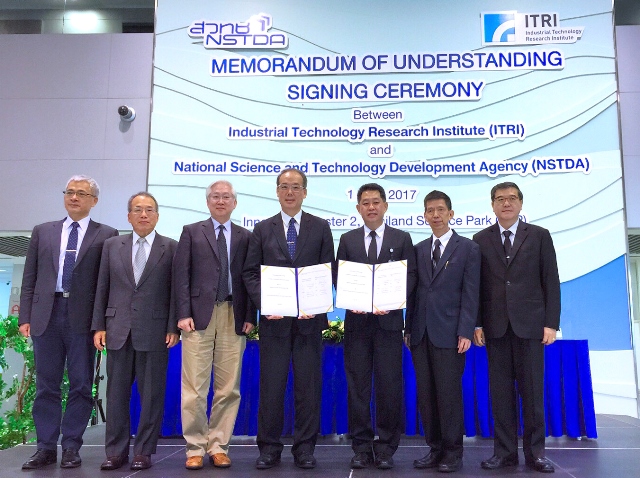New Southbound Policy Portal

ITRI President Liu Jonq-min (center) and NSTDA President Narong Sirilertworakul display the memorandum of understanding June 1 in Thailand. (Courtesy of ITRI)
Under the pact, the two sides will leverage their respective strategic advantages in assisting Taiwan firms operating in the Southeast Asian country to participate in the Thailand government’s Eastern Economic Corridor development project. This includes assessing private sector needs, identifying technological development trends and providing research support.
The memorandum was signed by ITRI President Liu Jonq-min and his NSTDA counterpart Narong Sirilertworakul at a ceremony in the Thai province of Pathum Thani.
According to ITRI, the EEC offers Taiwan companies—especially locally based small and medium enterprises planning supply chain integration with firms in the region—an array of opportunities in the biotech, digital and innovative economies, as well as market access for neighboring countries such as Cambodia and Myanmar. Budgeted at $1.5 trillion Thai baht (US$43.83 billion), the project involves major constructions such as an airport, new cities, a high-speed rail and a port.
The ITRI-NSTDA partnership is in line with President Tsai Ing-wen’s New Southbound Policy. A key component of the government’s national development strategy, the policy seeks to deepen Taiwan’s agricultural, business, cultural, educational, tourism and trade ties with the 10 Association of Southeast Asian Nations member states, six South Asian countries, Australia and New Zealand.
Headquartered in northern Taiwan’s Hsinchu County, ITRI is a nonprofit R&D organization established in 1973 to help local industries and SMEs stay competitive and sustainable. It functions as a driver of transformation in Taiwan’s industrial sectors, as well as a conduit for technological collaboration between Taiwan and other countries.
Established in 1991, NSTDA aims to promote the emergence of a knowledge-based society through science and technology. Its mission includes human resources and infrastructure development, R&D and technology transfer. (SFC-E)
Write to Taiwan Today at ttonline@mofa.gov.tw